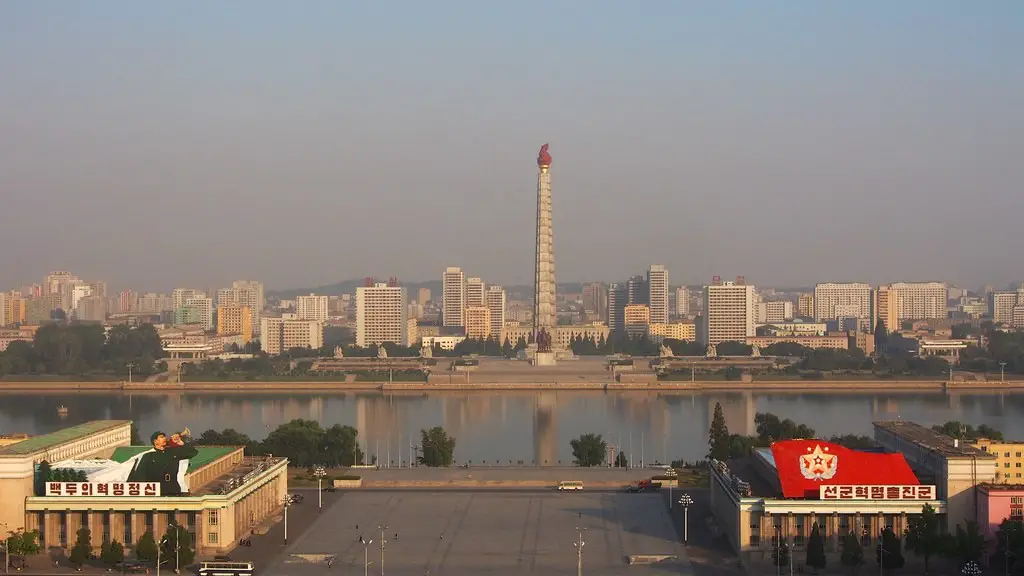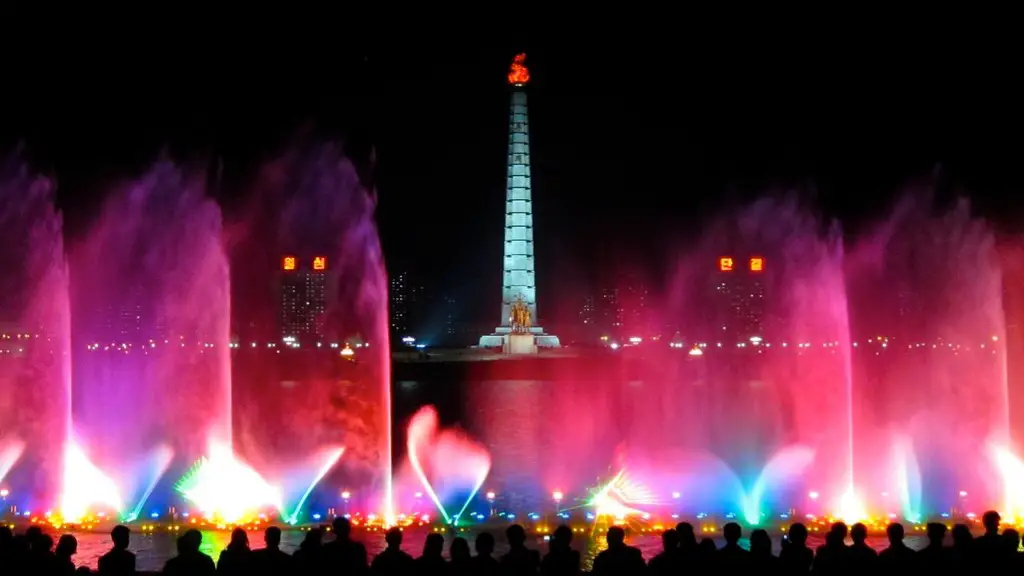Military and Economic Strategies
The United States is quite capable of containing and deterring North Korea’s aggression through military or economic means. In terms of military options, the United States has an array of capabilities for deterrence, ranging from conventional deployments of forces, imposing sanctions, or military action. Extensive deployments of air, naval and ground forces, coupled with the capability for precision strikes against North Korean forces, would ensure that Pyongyang knows the U.S. means business. This form of disproportionate deterrence could be used to make it absolutely clear to North Korea that any aggression, from a limited attack on a U.S. ally to a full-scale invasion, would not be tolerated.
From an economic perspective, the United States has some particular diplomatic and economic levers it can use to discourage North Korea’s aggression. Much of the North Korean economy is dependent on international trade and foreign aid, particularly from other countries in the region. This gives the United States and other countries the ability to impose economic sanctions or embargoes on North Korea, restricting their access to resources and further isolating them from the outside world. Additionally, the U.S. could use international forums such as the United Nations Security Council to further isolate Pyongyang diplomatically.
This form of economic punishment could go beyond the traditional sanctions and embargoes. The U.S. and its allies could use economic measures to directly target North Korean leadership and their core interests. For example, the U.S. could significantly reduce or entirely deny North Korea access to global banking systems, making it impossible for them to conduct international transactions or launder money abroad. The U.S. could also freeze and seize North Korean-held assets, reducing their access to the money and resources they need to continue pushing their agendas.
Diplomatic Solutions and Negotiations
In addition to military and economic measures, diplomatic solutions and negotiations are a key component of U.S. strategy in deterring North Korea and preventing negotiations for a peaceful resolution. The United States and other countries in the region have long sought to engage North Korea in diplomatic dialogues to try and de-escalate tensions and to push for a peaceful resolution.
At the same time, the United States has been pushing for the formation of “regional partnerships” with other countries in the region to ensure that the North Korean government does not carry out any aggressive or destabilizing actions. These partnerships, in a sense, protect the entire region and help counterbalance the power of North Korea. Additionally, these partnerships help create a stronger web of relationships and alliances that can be used to increase strategic leverage over Pyongyang and push them towards a more cooperative stance.
Another key point in U.S. diplomatic strategy is to increase the isolation of North Korea by leveraging the United Nations and other international organizations. By pushing for more severe sanctions and further embargoes, the United States can make it even more difficult for the North Korean government to conduct business or sustain their economy. At the same time, international opinion can be used to delegitimize North Korea’s actions and put pressure on Pyongyang to pursue a more moderate course of action.
Sanctions, Cyberwarfare, and Public Pressure
In addition to the diplomatic, economic and military strategies, the U.S. also has several other tools at its disposal to combat North Korea’s aggression. Sanctions are a popular option and can be used to target key financial and military players in the North Korean government. The U.S. can impose economic sanctions on entities and individuals connected to the North Korean government, making it difficult for them to access key resources and crippling the North Korean economy.
Cyber warfare is another potential tool the U.S. can use to combat North Korea’s aggressive actions. The use of malware, denial of service attacks, and other cyber tactics could be used to shut down North Korean networks and interfere with their military and civilian operations. This would put significant pressure on the North Korean government and may deter them from potentially aggressive actions.
Finally, the use of public pressure is another tool for the U.S. to combat North Korea’s aggression. By focusing attention on North Korea’s aggressive actions, the U.S. can rally public support for its cause and increase international pressure on North Korea. This could be done through the use of social media and other forms of public outreach to raise awareness of the issue and generate more pressure on North Korea to reconsider their actions.
Encouraging Defections and Change From Within
Another tool the U.S. can use to deter North Korea is by encouraging and supporting defections and other forms of change from within the country. This could involve providing more incentives and support for North Koreans who want to leave the country and providing a safe haven for those who do. Additionally, the U.S. can encourage and support opposition groups and activists inside North Korea to push for more democratic reforms and institute change from within the country.
This form of pressure could be used to force North Korea to become more open and transparent and implement more democratic reforms. It could also be used to encourage negotiations for a peaceful resolution and potentially even end the North Korean regime. By providing support and resources to oppositional forces, the U.S. could help create an environment within North Korea that is more conducive to dialogue and potentially lead to positive change.
Public Education and Support for Outsiders
Finally, the U.S. can also use public education and support for outsiders to help deter North Korean aggression. By raising awareness of the atrocities and humanitarian crisis in North Korea and providing assistance and financial support to those affected by the regime’s abuses, the U.S. can help counter the popular support of North Korea’s government and create an environment that is more responsive to outside criticism.
Additionally, the U.S. could use public education campaigns to highlight the human and economic costs of North Korea’s aggression and attempt to create an informed public opinion that is hostile to North Korea’s actions. By rallying worldwide support for the victims of North Korea’s aggression, the U.S. can create a powerful international pressure that would force North Korea to reconsider its actions.
International Aid and Humanitarian Intervention
In addition to the strategies outlined above, the U.S. could also provide assistance and humanitarian aid in response to North Korean aggression. This would involve providing assistance to those affected by North Korea’s abuses and human rights violations, including access to food, medicine and other essential resources. Additionally, the U.S. could advocate for increased humanitarian interventions and aid from organizations such as the UN and other international organizations to help those who are suffering under North Korea’s regime.
This form of assistance could be used to provide support and resources to those who are suffering under North Korea’s regime and create an environment within the region that is more amenable to dialogue and negotiations. Additionally, it could help create a more informed public opinion that is hostile to North Korea’s aggression and is more likely to hold them accountable for their actions.
Economic Pinch and Humanitarian Support
The combination of economic pressure and humanitarian support can be used to create further incentives for negotiations for North Korea to come to the table and pursue a peaceful resolution. By increasing economic pressure from the international community and providing assistance and resources to those affected by North Korea’s abuses, the U.S. can create a powerful incentive for Pyongyang to pursue a more cooperative stance.
At the same time, the U.S. can also use this strategy to increase the pressure on North Korea by rallying international support for those affected by their abuses and targeting key financial and military players in the North Korean government. This could have a significant impact on the North Korean government’s ability to conduct business internationally and weaken their grip on the country.
Negotiations and Humanitarian Solutions
In addition to economic and military strategies, the United States also has the option of engaging in diplomatic dialogues and negotiations with North Korea. The U.S. could use the power of international institutions, such as the United Nations, to create further incentives for negotiations and increased pressure on North Korea.
At the same time, negotiations for a peaceful resolution could also include a variety of humanitarian solutions and initiatives. The U.S. could negotiate for international aid and resources to be delivered directly to those in need and push for the lifting of economic sanctions as a reward for cooperation on a peaceful resolution. Additionally, the U.S. could advocate for increased human rights initiatives and promote democratic reforms inside North Korea in order to incentivize more cooperative behavior.
Engaging the International Community
The last tool the U.S. has in its arsenal to deter North Korean aggression is to engage the international community in its efforts. By rallying international support and engaging the public in its cause, the U.S. can create a powerful coalition of nations and individuals that are opposed to North Korea’s aggression. This could be done through public campaigns and social media outreach, as well as through diplomatic channels.
By engaging the international community in its efforts, the U.S. can draw on the resources and clout of the world’s major powers to further isolate North Korea and to create greater pressure for a peaceful resolution. Additionally, this could also be used to help inform and shape public opinion on North Korea, creating an environment that is more hostile to their actions and puts additional pressure on the North Korean government.


